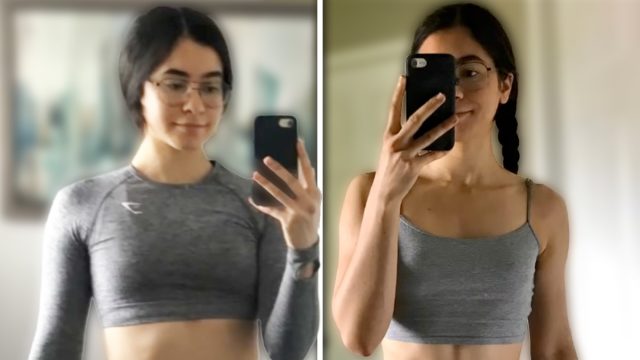This Trainer Dropped 15 Pounds of Fat With 15 Simple Changes That Actually Work
Like many of us, certified personal trainer Kenza Tounakti struggled with losing stubborn fat despite regular workouts. After years of trial and error, she finally cracked the code—losing 15 pounds of fat while gaining muscle in just 5 months. Here's her proven approach that can work for you, too.
Accept That Weight Loss Isn't Linear
"Losing weight isn't a linear experience," says Dr. David Creel, a licensed psychologist and Clinical Exercise Physiologist at Cleveland Clinic.
"You'll have ups and downs. But if the overall trend is downward, that's when you know you're having success." This matched Kenza's experience: "It took me 3-4 months to lose 15 pounds of fat. Quick fixes don't work."
Understand the Difference Between Weight Loss and Fat Loss
"Weight loss and fat loss aren't the same thing," says Kenza in her post. "When you lose weight, you're losing a combination of fat, muscle, and other tissue. But with fat loss, you're specifically targeting fat while preserving or even building muscle." This distinction proved crucial in her transformation journey.
Set Realistic Goals
Dr. Creel says to focus on behavior rather than just numbers: "Pay attention to the non-scale victories — like better sleep, more energy and improved fitness — you're less likely to get discouraged." Kenza agrees, noting how she focused more on body composition changes than scale weight.
Calculate Your Daily Energy Needs
Understanding your Total Daily Energy Expenditure (TDEE) is essential. "We're all unique beings, and our bodies have different needs," says Dr. Creel. "But at the end of the day, the most basic concept of losing weight is that you need to achieve a calorie deficit."
RELATED: This Mom Lost 135 Pounds Without Exercise and These Are the Foods She Cut Out
Create a Smart Calorie Deficit
"To lose one pound of fat per week, you need a 500-calorie daily deficit," Kenza says. Dr. Creel adds: "When we know how many calories you're burning, we might suggest getting about 500 calories a day fewer than that. But really, it should be a more individualized approach."
Understand Metabolic Adaptation
When weight loss stalls, there's a scientific explanation. "We call it metabolic adaptation," Dr. Creel explains. "It's your body trying to hold on to weight by slowing down your metabolism. We know it's healthy for us to lose excess weight, but your body doesn't. It's trying to protect you."
Prioritize Protein Intake
"Aim for 1.6-2.2 grams of protein per kilogram of body weight," Kenza says. This helps preserve muscle while losing fatwhich is crucial for maintaining a healthy metabolism.
Practice Volume Eating
"Volume eating changed everything for me," Kenza says. "By choosing foods that are naturally lower in calories but filling—like vegetables, fruits, and lean proteins—I could eat bigger portions while staying in a deficit."
RELATED: Woman Lost 38 Pounds After 45 With Daily Walks and These 2 Simple Changes
Don't Fear Carbs
"There's a huge misconception that you need to cut carbs to lose fat," says Kenza. "I ate carbs with every meal during my cut. They're your body's primary energy source."
Prioritize Sleep
Dr. Creel says about sleep: "If we aren't getting good rest, your hunger hormones (ghrelin and leptin) can get out of whack. You actually feel hungrier when you're not well-rested."
Stay Hydrated
Kenza says about water intake: "Aim for at least 2.7 liters daily for women and 3.7 for men. Often when you feel hungry, you're actually just thirsty."
RELATED: This Doctor Lost 25 Pounds in 90 Days By Dropping These 12 Daily Habits
Optimize Your Exercise Routine
Dr. Creel says: "I'll typically advise people who are looking to lose weight to ratchet up their workouts to something more like 250 to 300 minutes per week." Kenza achieved this through a combination of walking (8-10K steps daily) and strategic cardio sessions.
Focus on Strength Training
"Muscle is metabolically active," says Dr. Creel. "Your muscle burns through calories much faster, even if you're just sitting on the couch." Kenza adds: "Lifting weights was absolutely crucial. The more muscle you have, the more calories you burn—even at rest."
Track More Than Just Food
Dr. Creel suggests tracking emotions alongside food: "I like to encourage people to keep track not just of what they're eating, but also how they're feeling at mealtimes." This helps identify emotional eating patterns.
RELATED: She Lost 180 Pounds After Discovering These 16 Life-Changing Weight Loss Truths
Make It Sustainable
"Remember, getting leaner isn't about forcing yourself to get smaller," Kenza says. "It's about building a stronger, healthier body through sustainable habits." Dr. Creel adds: "That's why we have to think about how to lose weight as a lifestyle." And if you enjoyed this article, take advantage of these 15 Quick Ways to Lose Body Fat Percentage in a Week.





